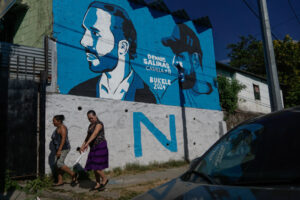Nine international human rights and legal groups have welcomed the resumption of the Guatemalan trial of Efraín Ríos Montt, the former military dictator, for genocide and crimes against humanity. The trial has taken another step towards its conclusion with the hearing of final arguments from the prosecution and victims’ representatives today and yesterday.
The trial of Ríos Montt, a former general who ruled Guatemala from 1982 to 1983, opened in Guatemala City on March 19, 2013. Together with Mauricio Rodriguez Sanchez, his former head of military intelligence, Rios Montt faces charges arising from atrocities against members of the country’s Mayan Ixil population.
“The Ríos Montt trial is being closely watched by advocates of international justice as a model of accountability,” said James A. Goldston, executive director of the Open Society Justice Initiative.
The trial had been stalled since late April due to a number of legal challenges and other actions by the defense team which may still threaten its completion. The process has also provoked increasingly belligerent commentary from allies of the two defendants, with published attacks on the presiding judges, the prosecution, local human rights defenders, and international non-governmental groups.
When the trial process was first interrupted on April 19, the court had already heard testimony from scores of Mayan Ixil survivors and relatives of victims of the alleged crimes.
The following groups are now urging the timely completion of the trial, and call on all concerned to remain committed to a trial process that respects the rights of both defendants and victims, while supporting justice and the rule of law in Guatemala: The Open Society Justice Initiative, Asociación Pro Derechos Humanos de España, the Center for Justice and Accountability, the Center for Justice and International Law, Centro de Estudios Legales y Sociales, Due Process of Law Foundation, the International Center for Transitional Justice, Rights International Spain, and Washington Office on Latin America.
The groups expressed concern over the defense team’s use of tactics apparently aimed primarily at delaying due process. They called on the Constitutional Court to limit legal challenges that delay and obstruct the process.
Defense lawyers have launched scores of legal challenges in the year between the indictment and the trial. Now that the trial has begun, the defense has repeatedly tried to prevent the trial from concluding, including the filing of many more legal challenges in recent weeks—challenges now being heard in various courts and forcing repeated interruptions and suspensions to the trial. The entire defense team also walked out of the trial en masse on April 18, against the orders of the judges that they remain.
Legal challenges have a crucial role – in this trial and elsewhere – in protecting the rights of defendants, victims and others. However, international law prohibits the abusive use of procedural delays to impede due process and the protection of the rights of victims and society, including the right of victims to an effective remedy.
In at least two cases against Guatemala, the Inter-American Court of Human Rights has criticized the “abusive use of the appeal [for legal protection, or amparo] as a delaying practice” to prevent human rights prosecutions. International law requires judicial intervention to ensure the avoidance of undue delays and obstructions that lead to impunity.
“The delays and obstructions are detrimental to the rights of the victims to see justice,” said Marcia Aguiluz, Program Director from the Central America and Mexico office of the Center for Justice and International Law.
Nearly 100 witnesses, including the survivors of mass killings and the families of victims, have testified about massacres and other atrocities, forced displacement, rape and sexual violence, torture, and forced assimilation and re-education. Forensic, military and other experts have also testified.
The trial marks the first time a former head of state has been tried for genocide in a local, rather than an international, court. The case concerns massacres and other violations committed more than 30 years ago. The case itself was filed 12 years ago.
“What is at stake is not just this trial, but also the credibility of the justice system in Guatemala,” said Marcie Mersky, director of programs at the International Center for Transitional Justice. “The case is also a major test for the effective prosecution of international crimes in domestic courts.”

